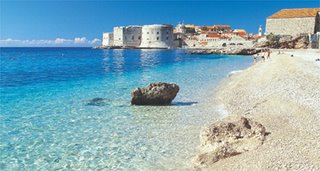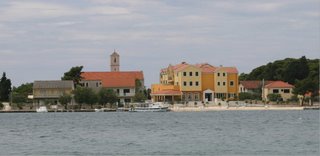 Photograph: Rafael Estepania/Time Out Guides
Photograph: Rafael Estepania/Time Out GuidesBefore you book that last minute late holiday to Croatia, take a few moments to think about whether it’s really the ideal destination for you and your family this month. If you’re restricted by school holidays, and aiming for sun and sand (or mostly pebbles in the case of Croatian beaches), then your choices are necessarily restricted. Here’s some information that may help you to decide whether to pick Croatia
On the upside, the Dalmatian Coast is only a two and a half hour flight away from London, and there’s now a wide choice of carriers to choose from. Croatia Airlines still seems to provide the best value at the moment, for short notice bookings - see our earlier posting
Croatia Online - Travel Information and Holiday Tips.
Why else should you choose Croatia?
The Mediterranean Weather
Although Croatia has been hot and sticky over the last week or so, the heat wave is now passing through and it should be much more pleasant. Most of us have now got used to the fact that global weather is much less predictable than it used to be so there’s not much to choose between the Mediterranean destinations in this respect.
The Islands
There are 1185 islands, islets and reefs in all and, if you choose carefully, you can still find some quiet ones if that’s what you’re looking for. Brac, Hvar and Ciovo, the nearest to Split, are all heaving with tourists at the moment. Search out some of the more isolated islands and their bays and you’re bound to find some holiday accommodation that’s not yet been snapped up - see below.
The Sea and the Scenery
The scenery is breathtaking and still relatively unspoilt. The indented coastline, and the mountains which rise up dramatically behind it, make for an idyllic holiday setting. “Crystal clear” has become a cliché for the Adriatic waters along the Croatian Coast but it’s an apt description. Some places, particularly the islands, are more crystal clear than others.
Apartments to Rent
Hotels rooms are in short supply in the restricted high season but apartments are plentiful. It’s a riskier option but, in general the Croatians are honest and straightforward to deal with. Have a look at our posting
Croatia Online - Holiday Apartments in Croatia for information on what to expect. There are plenty of commercial websites and agencies to help you choose but if you have the time to search the local tourist boards you’ll probably find a wider selection in the more remote destinations. Pick a destination and then go to the Croatia Tourist Board site (see useful websites below) which will list the websites of the local tourist boards. Some of the websites are more developed than others!
Cost of Living
The cost of eating out is still much lower than many other Mediterranean destinations and, in most places there’ll be plenty of choices of restaurants. The local offer is generally plain grilled fish and meat but new restaurants are slowly getting more adventurous. The exceptions are Dubrovnik and Hvar where you can expect to pay a bit more than elsewhere but have a much wider choice. If you’re self catering then meat and fish prices will be about the same as England but alcohol, fruit and vegetables considerably less.
The Ambience
The pace is easy, it’s a relatively safe country and the Croatians are a helpful, tolerant and courteous race. You generally won’t get bombarded with super sales techniques or interrogated as to your origins and spending power.
Undiscovered?
Not so much any more but there are still a few places that have yet to catch up with the leading tourist destinations. The small islands around Sibenik are a good example; Pasman and Ugljan islands, near Zadar, are another. If you don’t mind travelling a bit further to your destination, the trick is to pick an island or a mainland destination that’s not too close to the main airport destinations of Split, Rijeka, and Dubrovnik. The Istrian peninsular, in the north, is also a relatively easy destination by road, for the Germans, Italians, Austrians and Eastern Europeans and tends to be jam packed with tourists in July and August.
The downside to Croatia in the high season is probably the same for most Mediterranean destinations at this time of year. In Croatia’s case this is somewhat exacerbated by the fact that the explosion of tourists, that comes along with it’s relatively new found popularity, can place a strain on an infrastructure that is not yet quite geared up to it. The population in some areas can more than quadruple in the summer season, and with heat waves, droughts and an old network of roads, this can cause power cuts, water shortages and traffic jams. The new motorway helps, and the authorities are working as hard as they can to relieve the strain but there’s a way to go yet. That’s the price you pay for getting the chance to see the “Mediterranean as it once was” with the infrastructure that once was as well
Hotel Accommodation
There are plenty of huge old style package hotels around but they don’t tend to suit the modern western European holiday maker. Small family or boutique hotels are in short supply though there are many more planned. It will be interesting to see if these can be fast tracked through Croatia’s bureaucratic and grinding systems for planning permissions and licences.
Beaches
We’ve seen portaloos and little changing rooms spring up from nowhere for the first time this year and the regular cleaning of the beaches takes place before the high season. However the most popular destinations have beaches that are jam packed. Remember that most Croatian beaches are pebbles, not sand, so plastic shoes are essential. Look at
Croatia Online - Croatian Beaches for more information on this subject.
Marinas and Moorings
If you’re planning a sailing holiday you’ll need to get to your evening destination early to be assured of a mooring in July and August, particularly in the hotspots around Hvar and Dubrovnik.
Entertainment for Children
In short supply on those fortunately rare rainy days. There’s little in the way of leisure parks - entertainment is generally confined to music and dance in the summer festivals that are held in almost every town or village of any reasonable size. If your children don’t like swimming and the odd banana ride, be prepared for the boredom factor to creep in.
Travel Complications
If you’re unlucky enough to have a delayed flight, you may find the ground staff in Croatia a little less proactive than you might like. This is down to lack of experience rather than a lack of willingness and, despite the frustrations, it pays to be patient with them. They will sort you out, eventually. Just bear in mind that two years ago, the only scheduled international flights to Split were by Croatian Airlines and now there are three more carriers operating regular scheduled services to Split, as well as a marked increase in the number of chartered flights in the summer. A long delay is rare, and it’s usually out of the hands of the ground staff, so look kindly on them if you can as they’re learning fast. For more information on Split Airport, see our earlier posting
Croatia Online - Split Airport***
You’ll find crowds and traffic at any Mediterranean destination worth going to in July and August. If you do your research properly, you’ll have a better chance of avoiding them in Croatia. However, if you have the choice, you’ll get the best from Croatia in September when most of the tourists have gone and the sea’s still warm. Many of the seasonal bars and restaurants may well be counting their money and have closed by then but, in villages and towns of any size, you’ll still find somewhere. Hopefully the Croatian Tourist Industry will soon learn that it’s in their interests to extend the tourist season outside the traditional months of July and August. See
Croatia Online - Which Destination and When? for more information on where and when to go, and what to do.
Useful Websites
Visit Croatia
http://www.visit-croatia.co.uk/Croatia Tourist Board
www.croatia.hrGuardian Travel Tips
I've been there CroatiaAirline & Travel Information
Croatia Online - Travel InformationUseful Publications
The most recent and up to date guide book on Croatia is published by Time Out who have also produced a Magazine for Visitors to Croatia, on sale at all the major international bookshops, at Croatian "Tisaks" (kiosks), or via its website. Go to
http://www.timeout.com/travel/croatia/ for more information. Today's photo is reproduced by courtesy of Time Out Publications and features on the front cover of its guide.
***
Readers please note that we have today, 4th July 2009, published an update to this posting which you can find by clicking
here.






